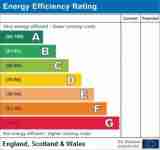Energy Performance Regulations

Energy Performance Certificates
EPCs are a legal requirement when constructing, selling or renting out a property. They have to be carried out by an accredited assessor which will produce two ratings, one on a scale of 1-100 for its energy efficiency with 1 being extremely energy efficient and 100 being not at all and these are then banded into grades A-G. In order to let a property, you have to have a minimum grade rating of E.
The EPC will also provide a list of recommendations as to how to improve the efficiency levels in the future as well as breaking down individual parts of the property for their efficiency rating such as the roof, walls, windows etc.
Listed buildings are exempt from having an EPC but this is on the basis in so far as compliance with minimum energy performance requirements would unacceptably alter the character and appearance of the property. Some measures for a listed building might be minimal such as replacing the boiler but others such as replacing the windows would actually change its overall impact and as such this is the reason why listed buildings have this exemption.
Conservation Areas
Buildings in conservation areas now have the same exemption status as listed buildings but conservation areas have differing levels of planning controls which can limited permitted development rights. For example, in a conservation area planning consent would usually be required for changes to the external materials, for example changing windows to double glazing. Again, works that unacceptably alter the buildings character and appearance in a conservation area would be those that effect the outside of the building more than the inside.
Other Exemptions to an EPC
There are other properties that are exempt from obtaining an EPC and these include:
Places of worship.
Stand-alone buildings less than 50 square metres in floor space.
Industrial areas including work shops and non-residential agricultural buildings.
Holiday accommodation rented out less than 4 months a year.
Residential buildings intended to be used less than 4 months a year.
Temporary buildings used for less than 2 years.
Rented Property
If you privately rent a property then this is governed by the Private Rented Sector Regulations 2015. Generally, a building is exempt from having an EPC when it does not come within the scope of such regulations but if it already has an EPC then it does come within the scope. These regulations require that from 1st April 2020 all existing domestic tenancies have to have a minimum EPC rating of E and from 1st April 2023 this minimum E rating will then extend to non-domestic tenancies too.
If you have a listed building that already has an EPC which was obtained before January 2013 then the property will be within the scope of these regulations. If the EPC has an F or G rating then some energy efficiency improvements will be required to raise the level to E or above. Often such changes have a minimal impact to the character and appearance of the property. For example, installing loft insulation or having a more efficient boiler.
Landlords can be exempt from these regulations if they are:
Unable to obtain third party consent for the works such as listed building consent or planning permission.
Where the installation measures may devalue the property more than 5%.
Where a measure such as solid wall insulation would risk compromising the building fabric.
Building Works
Often when building new properties building control will require compliance with Energy Performance Regulations to ensure that the works are undertaken in an efficient manner so as to achieve a high-level EPC rating when the property is built.
We hope that this blog is of some use to you giving you a basic understand of how EPC and Energy Performance Regulations work.
Links
Offices
Social
Bright Solicitors